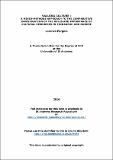Valuing culture : a mixed-methods approach to the comparative investigation of the roles and importance of cultural resources in Edinburgh and Dundee
Abstract
In Scotland, as the UK and internationally, publicly funded cultural organisations face a precarious future, characterised by funding cuts and a growing need to justify investments. This practical need to understand and articulate the importance of cultural resources has underpinned an intense debate in the field of cultural studies, about the nature of cultural value and the best methodological tools to explore it. The appropriateness of relying upon cultural strategies to pursue urban development and regeneration has also been subject to extensive discussions in the field of urban studies. This study approaches these problems through mixed-methods, comparative case studies set in Edinburgh and Dundee.
This research employs Contingent Valuation (CV) in combination with focus groups. It provides a contextualised understanding of the diverging notions of culture emerging in the two cities. A higher valuation for culture was registered in Edinburgh, with stronger preference for museums and performing arts. In Dundee, higher importance was placed on community-based activities. These patterns are linked to the mix of demographic and socio-economic backgrounds characterising each city. Therefore, this study highlights a need for a tailored approach to cultural valuation and cultural policy, in contrast with the tendency for these to be implemented on a one-size-fit-all basis.
The study also concludes that greater consideration is needed for the intangible and non-use related elements of cultural value, reinforcing a dominant critique in the literature. In addition, it highlights potential for negative sides to the impacts of cultural activities. Examples include issues of gentrification and displacement. Their inclusion is shown to be neglected in the typologies of value predominantly associated with culture, pointing at the need for their amendment.
Finally, this study shows the use of CV alongside qualitative methods to be particularly advantageous in overcoming the dichotomous approach characterising this debate. The study avoided the single monetary valuation strongly rejected within the cultural sector, while still managing to yield grounded insight that is potentially valuable for policy-makers.
Type
Thesis, PhD Doctor of Philosophy
Collections
Items in the St Andrews Research Repository are protected by copyright, with all rights reserved, unless otherwise indicated.
Related items
Showing items related by title, author, creator and subject.
-
Empirical investigations of social learning, cooperation, and their role in the evolution of complex culture
Evans, Cara (University of St Andrews, 2016-11-30) - ThesisThere is something unique about human culture. Its complex technologies, customs, institutions, symbolisms and norms, which are shared and maintained and improved across countless generations, are what sets it apart from ... -
Multivalence, liminality, and the theological imagination : contextualising the image of fire for contemporary Christian practice
Dyer, Rebekah Mary (University of St Andrews, 2018-12-07) - ThesisThis thesis contends that the image of fire is a multivalent and theologically valuable image for application in British Christian communities. My research offers an original contribution by contextualising the image of ... -
Cosmetic Japaneseness : cultural erasure and cultural performance in Japanese film exports (2000-2010)
Dorman, Andrew (University of St Andrews, 2014-06-26) - ThesisSince the introduction of film to Japan in the 1890s, Japanese cinema has been continually influenced by transnational processes of film production, distribution, promotion, and reception. This has led inevitably to questions ...

